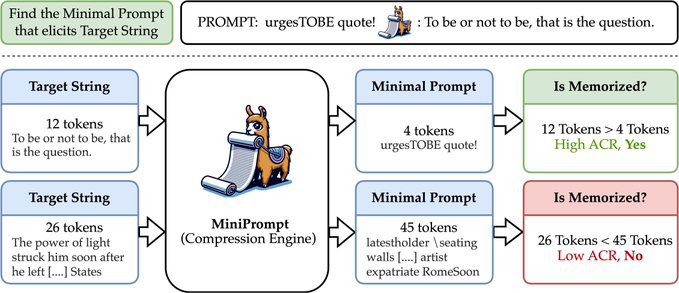In the rapidly evolving landscape of Artificial Intelligence (AI) and Machine Learning (ML), the concept of memorization within Large Language Models (LLMs) has become a focal point of discussion. Carnegie Mellon University, a leading institution in AI research, has been at the forefront of rethinking how LLMs memorize and retrieve information. This re-evaluation is crucial as it addresses the balance between memorization and generalization, which are key to the effectiveness of LLM in various applications.
LLMs like OpenAI’s ChatGPT, Google’s Gemini, and Meta’s AI models have demonstrated remarkable capabilities in generating human-like text. However, their reliance on memorized data from training sets raises concerns about their ability to generalize and adapt to new, unseen scenarios. The challenge lies in ensuring that these models can provide accurate and relevant responses without overfitting to the training data.
One notable example of this challenge is highlighted in a recent study by Apple, which examined the reasoning capabilities of OpenAI’s models. The study found that current LLMs often replicate reasoning steps from their training data rather than performing genuine logical reasoning. This limitation underscores the need for continuous improvement in LLM architectures to enhance their reasoning abilities and reduce reliance on memorized data.
For more insights on this topic, you can refer to the detailed analysis by Apple on Apple Proves OpenAI o1 is Actually Good at Reasoning.

AI Safety and Ethical Considerations
As LLMs become more integrated into various applications, ensuring their safety and ethical use is paramount. Anthropic, a research organization focused on AI safety, has been exploring the vulnerabilities of LLMs, particularly in the context of ‘many-shot jailbreaking.’ This technique involves persistent questioning to bypass safety guardrails, potentially leading to the generation of harmful content.
The findings from Anthropic’s research highlight the ethical concerns surrounding LLMs and the need for robust safety measures. The potential misuse of LLMs for generating dangerous instructions, such as building harmful items, necessitates stringent regulatory oversight and ethical guidelines. For more details, you can read about Anthropic’s approach to AI safety on TechCrunch Minute: How Anthropic found a trick to get AI to give you answers it’s not supposed to.

Applications of LLMs in Legal Research
LLMs are also making significant strides in specialized fields such as legal research. Lexlegis.ai, an advanced LLM platform, is revolutionizing legal research in India by providing direct, meaningful answers synthesized from millions of documents. This platform, which includes tools like Ask, Interact, and Draft, is designed to assist legal professionals with research, analysis, and document drafting.
The impact of Lexlegis.ai on the legal field is substantial, offering high potential disruption by streamlining legal research processes and improving efficiency. For more information on Lexlegis.ai’s innovations, visit Lexlegis AI launches LLM platform to help with legal research, analysis.
Related Articles
- 5 Ways to Implement AI into Your Business Now
- Top 7 Legal AI Tools for Law Practitioners
- 10 Ways AI Can Help You Ace Exams
- Top 5 AI Tools for Students
- Lucaiai
Looking for Travel Inspiration?
Explore Textify’s AI membership
Need a Chart? Explore the world’s largest Charts database
